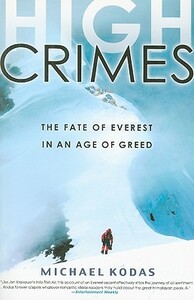You need to sign in or sign up before continuing.
Take a photo of a barcode or cover
The idea of traversing Mt. Everest is one of those incredibly lofty goals that so few people will ever attain. Beyond being physically demanding, the human body is not meant to be at those altitude, and the price to get there seems astronomical.
This book god my attention via Reddit when I said I would read anything Jon Krakauer ever wrote and enjoyed Into Thin Air. In that book that is ultimately a tragedy, he indicates that for every one person who summits, six perish (I believe). He is writing a story about just worst case scenario followed by worst case scenario that led to a huge tragedy.
What this book discusses is the greed behind making the top of the world. The author discusses tangible prices about the commitment of this type of climbing and what cost it really comes at. He touches on the environmental aspect, but it’s really about the prices and the greed that follow. It’s the nickel and dime expenses all the way up and the frauds that get people to pay them.
If you’re only starting an interest in reading about climbing, I would not recommend this book. This is a little deeper and seedier. If you’ve read a book on the subject or two then this may be for you.
This book god my attention via Reddit when I said I would read anything Jon Krakauer ever wrote and enjoyed Into Thin Air. In that book that is ultimately a tragedy, he indicates that for every one person who summits, six perish (I believe). He is writing a story about just worst case scenario followed by worst case scenario that led to a huge tragedy.
What this book discusses is the greed behind making the top of the world. The author discusses tangible prices about the commitment of this type of climbing and what cost it really comes at. He touches on the environmental aspect, but it’s really about the prices and the greed that follow. It’s the nickel and dime expenses all the way up and the frauds that get people to pay them.
If you’re only starting an interest in reading about climbing, I would not recommend this book. This is a little deeper and seedier. If you’ve read a book on the subject or two then this may be for you.
I didn't love this as much as Into Thin Air. First of all, the narrative kept jumping around, which is fine in a book about just a few characters, but there were SO many different climbers that I kept getting mixed up.
And secondly, it got depressing. How many people have to have horrible frozen deaths on Everest before people get sensible?
And secondly, it got depressing. How many people have to have horrible frozen deaths on Everest before people get sensible?
adventurous
informative
reflective
medium-paced
High Crimes was yet another excellent addition to my armchair mountaineering library. It was also yet another reason why I never want to climb Everest.
Kodas outlines two major stories, the death of Nils Antezana, and his own attempt at the summit with a greedy guide. In between the tellings of those stories, he highlights other events that happen on the mountain from rip-off oxygen bottles to the plundering of high camps.
I was fascinated by this look into the deception that occurs on the world's highest mountain and saddened by the attempts of Antezana's family to find answers about their father's death from his fraudulent guide Gustavo who stole a climber's pictures from the summit to make it look as if he had the credentials to lead a client onto Everest, when in reality, he never reached the top. I felt as if the story was a little jumpy toward the beginning and I got confused as to which sketchy guide went with the different climbers, as both of the guide's names started with G. However, the story smoothed out toward the end and I thoroughly enjoyed this read.
Kodas outlines two major stories, the death of Nils Antezana, and his own attempt at the summit with a greedy guide. In between the tellings of those stories, he highlights other events that happen on the mountain from rip-off oxygen bottles to the plundering of high camps.
I was fascinated by this look into the deception that occurs on the world's highest mountain and saddened by the attempts of Antezana's family to find answers about their father's death from his fraudulent guide Gustavo who stole a climber's pictures from the summit to make it look as if he had the credentials to lead a client onto Everest, when in reality, he never reached the top. I felt as if the story was a little jumpy toward the beginning and I got confused as to which sketchy guide went with the different climbers, as both of the guide's names started with G. However, the story smoothed out toward the end and I thoroughly enjoyed this read.
informative
fast-paced
As someone with a Bachelor’s degree in Criminology that’s working towards a Master’s degree in Criminal Justice, I’ve never once thought about how crime might impact Mt. Everest. I had to read this book for one of my grad classes but I think it’s one of my favorite books that I’ve ever been assigned to read. Kodas weaves all the experiences together into an intricate web that left me completely shocked at times. I think the following quote on the back cover sums the book up best: “Where man is every bit as deadly as Mother Nature”. I would recommend this book to anyone who has even a remote interest in human behavior, or anybody who is looking for a very interesting and thought-provoking read.
This book is mainly comprised of retellings of two different Everest expeditions: Kodas' own disastrous climb with a team from Connecticut, and a decidedly more tragic account of an older Bolivian-American doctor tackling the mountain. When Kodas is talking about the doctor, Nils Antezana, he is good - almost great. When he's talking about the Connecticut team, he is, well. Whiny. I'm not out to discredit the guy; he has plenty of evidence to back up his own claims, and the crew he was climbing with seem like genuine assholes, but it didn't make for great reading.
When he's not talking about his own problems, Kodas is good. Corrupt oxygen dealers, human rights violations, falsified guiding credentials, life-threatening theft on a regular basis. I knew Everest was screwed up, but I didn't know quite how badly.
Mostly, this book was depressing. Maybe it isn't fair to compare this book to [b:Into Thin Air|1898|Into Thin Air A Personal Account of the Mt. Everest Disaster|Jon Krakauer|http://photo.goodreads.com/books/1158966247s/1898.jpg|1816662], but the blurb on the cover did it first, so I feel okay about it. Michael Kodas is not Jon Krakauer, but my love for Krakauer is deep and abiding, and I think pretty much anyone writing about mountains is going to suffer in comparison. I think Kodas wanted to strip away the romance of Everest and make it perfectly clear how money and traffic and a never-ending list of records to be set (first one-armed Korean with astigmatism to summit!) have affected high-altitude climbing. And he did. But at times, that just left me wondering whether he even likes climbing, which is something I never wonder when I'm reading Krakauer.
When he's not talking about his own problems, Kodas is good. Corrupt oxygen dealers, human rights violations, falsified guiding credentials, life-threatening theft on a regular basis. I knew Everest was screwed up, but I didn't know quite how badly.
Mostly, this book was depressing. Maybe it isn't fair to compare this book to [b:Into Thin Air|1898|Into Thin Air A Personal Account of the Mt. Everest Disaster|Jon Krakauer|http://photo.goodreads.com/books/1158966247s/1898.jpg|1816662], but the blurb on the cover did it first, so I feel okay about it. Michael Kodas is not Jon Krakauer, but my love for Krakauer is deep and abiding, and I think pretty much anyone writing about mountains is going to suffer in comparison. I think Kodas wanted to strip away the romance of Everest and make it perfectly clear how money and traffic and a never-ending list of records to be set (first one-armed Korean with astigmatism to summit!) have affected high-altitude climbing. And he did. But at times, that just left me wondering whether he even likes climbing, which is something I never wonder when I'm reading Krakauer.
This was my first book about Everest and was quite illuminating--I would definitely recommend that anyone seriously considering climbing the mountain read this book first to know what to watch out for! Kodas relates all kinds of reprehensible human behavior taking place around the mountain, much of it tragically leading to the loss of human life: guides misrepresenting their level of experience, people selling faulty equipment, rampant theft even high up on the mountain, and even guides completely abandoning their clients in some of the most perilous conditions on Earth. Kodas himself was part of an expedition that went sour, but the book is at its best when he's relating stories he wasn't immediately involved in (the parts about his own story often feel uncomfortably like being involved in a personal feud in which not all the parties have a chance to defend themselves). This isn't a book to read if you're primarily interested in the beauty of Everest or want triumphant stories about human perseverance and accomplishment, but it was interesting throughout and has definitely made me want to learn more about Everest and mountaineering.
adventurous
challenging
dark
informative
sad
tense
medium-paced






